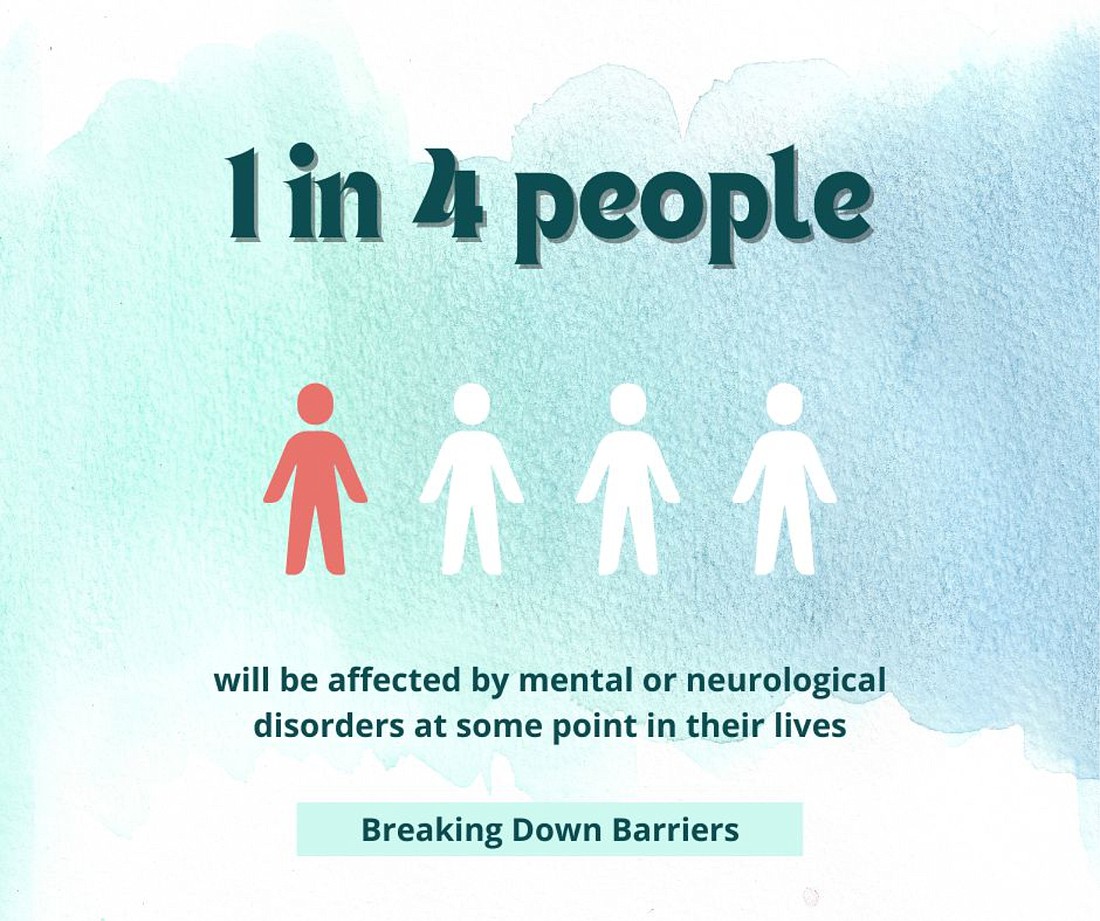Breaking Down Barriers: Navigating Mental Health
August 9, 2023 at 12:00 a.m.

This is a year-long series, made possible by the "Together We Will" Grant. Over the next year, we'll be casting a spotlight on three of the most pressing health crises in our rural communities: Substance Use Disorder, Infant and Maternal Mortality, and Mental Health. Through deeply personal stories and expert insights, we aim to humanize these issues, drive conversation, and spark action towards a healthier future. Stay with us for this important journey.
Navigating mental health is complicated. The signs and symptoms of mental health issues vary in severity and frequency from person to person, making it hard to determine if what someone is feeling is something situational that may pass on its own or whether it's something persistent that requires professional help. For most, when dealing with a health issue, it's natural to pick up the phone and call a friend or family member for some advice before heading to the doctor. However, a stigma accompanies mental health issues, making it a tricky topic to ask for an opinion on, and it often comes with shame. Beyond the stigma, it is not always visible to others. It's like having a broken bone no one can see, making it even harder to explain and understand.
Navigating mental health in a small community poses additional challenges. The seven counties Whitewater Publications serves in southeastern Indiana are primarily rural, with relatively small populations and limited access to healthcare services and resources. Combine that with the fact many individuals and families within our hometowns face significant barriers to healthcare access, including a lack of insurance, transportation, and affordable healthcare services, and it can make a challenging situation seem hopeless.
Throughout the series, the desire is to help break down barriers like those listed above by providing a support system for the people we live and work with every day. A support system of first-hand insight, compassion, education and attainable resources to utilize in your hometown.
It's important to know that mental health issues do not need to be "serious" for you to reach out for support. Whatever you're going through, your feelings and experiences are valid, and you deserve support. Taking care of your mental health is just as important as taking care of your physical health.
How to Tell the Difference Between Mild and Serious Mental Health Challenges
The JED Foundation shares that mental health professionals typically measure the seriousness of a mental health issue by its impact on a person's everyday life and by the circumstances that led to the issue. Mild mental health challenges are often less persistent and disruptive to a person's daily life. In contrast, serious mental health challenges can be so severe they negatively impact a person's relationships or performance at work or school.
For example, let's say a student has an important exam coming up. Feeling some stress or anxiety before the exam is normal. But if the anxiety is so severe that the student skips school to avoid taking the exam, that would be more concerning because it disrupts their everyday routine and can cause concrete negative consequences in their life or well-being. Severe anxiety that leads to physical symptoms or panic attacks would also be a reason to seek support.
It's also essential to consider the context around a mental health challenge. It's normal to feel sadness or grief after the death of a loved one, feel angry after a breakup, or feel anxious about starting a new job. In these situations, it can be helpful to talk to a therapist or counselor about how you're feeling—but it may not be considered a severe challenge unless it's negatively impacting your everyday life.
But, trying to tell the difference between what expected behaviors are and what might be the signs of a mental illness isn't always easy. There's no simple test to diagnose mental illness, and each illness has its own symptoms.
Adult Mental Health Symptoms
Still, the National Alliance on Mental Illness shared common signs of mental illness in adults and adolescents can include the following:
•Excessive worrying or fear
•Feeling excessively sad or low
•Confused thinking or problems concentrating and learning
•Extreme mood changes, including uncontrollable "highs" or feelings of euphoria
•Prolonged or strong feelings of irritability or anger
•Avoiding friends and social activities
•Difficulties understanding or relating to other people
•Changes in sleeping habits or feeling tired and low energy
•Changes in eating habits such as increased hunger or lack of appetite
•Changes in sex drive
•Difficulty perceiving reality (delusions or hallucinations, in which a person experiences and senses things that don't exist in objective reality)
•Inability to perceive changes in one's own feelings, behavior or personality ("lack of insight" or anosognosia)
•Overuse of substances like alcohol or drugs
•Multiple physical ailments without obvious causes (such as headaches, stomach aches, vague and ongoing "aches and pains")
•Thinking about suicide
•Inability to carry out daily activities or handle daily problems and stress
•Intense fear of weight gain or concern with appearance
Youth Mental Health Symptoms
Mental health conditions can also begin to develop in young children. Their most obvious symptoms are behavioral because they're still learning how to identify and talk about thoughts and emotions. Symptoms in children may include the following:
•Changes in school performance
•Excessive worry or anxiety, for instance, fighting to avoid bed or school
•Hyperactive behavior
•Frequent nightmares
•Frequent disobedience or aggression
•Frequent temper tantrums
Where To Get Help
Learning all you can about mental health is an essential first step. You can start by contacting your health insurance, primary care doctor, or state/county mental health authority for more resources.
988 Suicide & Crisis Lifeline
The lifeline provides 24/7, free and confidential support for people in distress, prevention and crisis resources for you or your loved ones, and best practices for professionals. You'll be connected to a skilled, trained counselor. For more information, visit the National Suicide Prevention Lifeline. To utilize The Lifeline, dial 9-8-8 or call 1-800-273-TALK (1-800-273-8255) or the online Lifeline Crisis Chat.
Veterans Crisis Line
If you're a veteran in crisis or concerned about one, the Veterans Crisis Line is a free, confidential resource that connects you to a real person specially trained to support veterans. Call 1-800-273-8255, Press 1 or visit https://www.veteranscrisisline.net/.
Mental Health providers
Community Mental Health Center, Inc.
285 Bielby Road
Lawrenceburg, IN 47025
Phone: 812-537-1302
Web Page: http://www.cmhcinc.org/
For a full list of mental health providers in Indiana, visit https://www.in.gov/ fssa/dmha/apply-for-services/mental-health-services/providers-for-adults/.
Substance Abuse and Mental Health Services Administration website
Find resources for veterans, substance abuse, opioid treatment, disaster distress and more by visiting https://www.samhsa. gov/find-help.
Rural Advancement Foundation International (RAFI-USA) Farmer Crisis Hotline
If you are in crisis (or know someone else who is in crisis) and need someone to talk to, the RAFI hotline can help. The hotline is open Monday-Friday from 9 a.m. to 6 p.m. Call 866.586.6746 (toll free)
NAMI Helpline
Contact the NAMI HelpLine to find out what services and supports are available in your community.
Latest News
E-Editions
Events
This is a year-long series, made possible by the "Together We Will" Grant. Over the next year, we'll be casting a spotlight on three of the most pressing health crises in our rural communities: Substance Use Disorder, Infant and Maternal Mortality, and Mental Health. Through deeply personal stories and expert insights, we aim to humanize these issues, drive conversation, and spark action towards a healthier future. Stay with us for this important journey.
Navigating mental health is complicated. The signs and symptoms of mental health issues vary in severity and frequency from person to person, making it hard to determine if what someone is feeling is something situational that may pass on its own or whether it's something persistent that requires professional help. For most, when dealing with a health issue, it's natural to pick up the phone and call a friend or family member for some advice before heading to the doctor. However, a stigma accompanies mental health issues, making it a tricky topic to ask for an opinion on, and it often comes with shame. Beyond the stigma, it is not always visible to others. It's like having a broken bone no one can see, making it even harder to explain and understand.
Navigating mental health in a small community poses additional challenges. The seven counties Whitewater Publications serves in southeastern Indiana are primarily rural, with relatively small populations and limited access to healthcare services and resources. Combine that with the fact many individuals and families within our hometowns face significant barriers to healthcare access, including a lack of insurance, transportation, and affordable healthcare services, and it can make a challenging situation seem hopeless.
Throughout the series, the desire is to help break down barriers like those listed above by providing a support system for the people we live and work with every day. A support system of first-hand insight, compassion, education and attainable resources to utilize in your hometown.
It's important to know that mental health issues do not need to be "serious" for you to reach out for support. Whatever you're going through, your feelings and experiences are valid, and you deserve support. Taking care of your mental health is just as important as taking care of your physical health.
How to Tell the Difference Between Mild and Serious Mental Health Challenges
The JED Foundation shares that mental health professionals typically measure the seriousness of a mental health issue by its impact on a person's everyday life and by the circumstances that led to the issue. Mild mental health challenges are often less persistent and disruptive to a person's daily life. In contrast, serious mental health challenges can be so severe they negatively impact a person's relationships or performance at work or school.
For example, let's say a student has an important exam coming up. Feeling some stress or anxiety before the exam is normal. But if the anxiety is so severe that the student skips school to avoid taking the exam, that would be more concerning because it disrupts their everyday routine and can cause concrete negative consequences in their life or well-being. Severe anxiety that leads to physical symptoms or panic attacks would also be a reason to seek support.
It's also essential to consider the context around a mental health challenge. It's normal to feel sadness or grief after the death of a loved one, feel angry after a breakup, or feel anxious about starting a new job. In these situations, it can be helpful to talk to a therapist or counselor about how you're feeling—but it may not be considered a severe challenge unless it's negatively impacting your everyday life.
But, trying to tell the difference between what expected behaviors are and what might be the signs of a mental illness isn't always easy. There's no simple test to diagnose mental illness, and each illness has its own symptoms.
Adult Mental Health Symptoms
Still, the National Alliance on Mental Illness shared common signs of mental illness in adults and adolescents can include the following:
•Excessive worrying or fear
•Feeling excessively sad or low
•Confused thinking or problems concentrating and learning
•Extreme mood changes, including uncontrollable "highs" or feelings of euphoria
•Prolonged or strong feelings of irritability or anger
•Avoiding friends and social activities
•Difficulties understanding or relating to other people
•Changes in sleeping habits or feeling tired and low energy
•Changes in eating habits such as increased hunger or lack of appetite
•Changes in sex drive
•Difficulty perceiving reality (delusions or hallucinations, in which a person experiences and senses things that don't exist in objective reality)
•Inability to perceive changes in one's own feelings, behavior or personality ("lack of insight" or anosognosia)
•Overuse of substances like alcohol or drugs
•Multiple physical ailments without obvious causes (such as headaches, stomach aches, vague and ongoing "aches and pains")
•Thinking about suicide
•Inability to carry out daily activities or handle daily problems and stress
•Intense fear of weight gain or concern with appearance
Youth Mental Health Symptoms
Mental health conditions can also begin to develop in young children. Their most obvious symptoms are behavioral because they're still learning how to identify and talk about thoughts and emotions. Symptoms in children may include the following:
•Changes in school performance
•Excessive worry or anxiety, for instance, fighting to avoid bed or school
•Hyperactive behavior
•Frequent nightmares
•Frequent disobedience or aggression
•Frequent temper tantrums
Where To Get Help
Learning all you can about mental health is an essential first step. You can start by contacting your health insurance, primary care doctor, or state/county mental health authority for more resources.
988 Suicide & Crisis Lifeline
The lifeline provides 24/7, free and confidential support for people in distress, prevention and crisis resources for you or your loved ones, and best practices for professionals. You'll be connected to a skilled, trained counselor. For more information, visit the National Suicide Prevention Lifeline. To utilize The Lifeline, dial 9-8-8 or call 1-800-273-TALK (1-800-273-8255) or the online Lifeline Crisis Chat.
Veterans Crisis Line
If you're a veteran in crisis or concerned about one, the Veterans Crisis Line is a free, confidential resource that connects you to a real person specially trained to support veterans. Call 1-800-273-8255, Press 1 or visit https://www.veteranscrisisline.net/.
Mental Health providers
Community Mental Health Center, Inc.
285 Bielby Road
Lawrenceburg, IN 47025
Phone: 812-537-1302
Web Page: http://www.cmhcinc.org/
For a full list of mental health providers in Indiana, visit https://www.in.gov/ fssa/dmha/apply-for-services/mental-health-services/providers-for-adults/.
Substance Abuse and Mental Health Services Administration website
Find resources for veterans, substance abuse, opioid treatment, disaster distress and more by visiting https://www.samhsa. gov/find-help.
Rural Advancement Foundation International (RAFI-USA) Farmer Crisis Hotline
If you are in crisis (or know someone else who is in crisis) and need someone to talk to, the RAFI hotline can help. The hotline is open Monday-Friday from 9 a.m. to 6 p.m. Call 866.586.6746 (toll free)
NAMI Helpline
Contact the NAMI HelpLine to find out what services and supports are available in your community.





